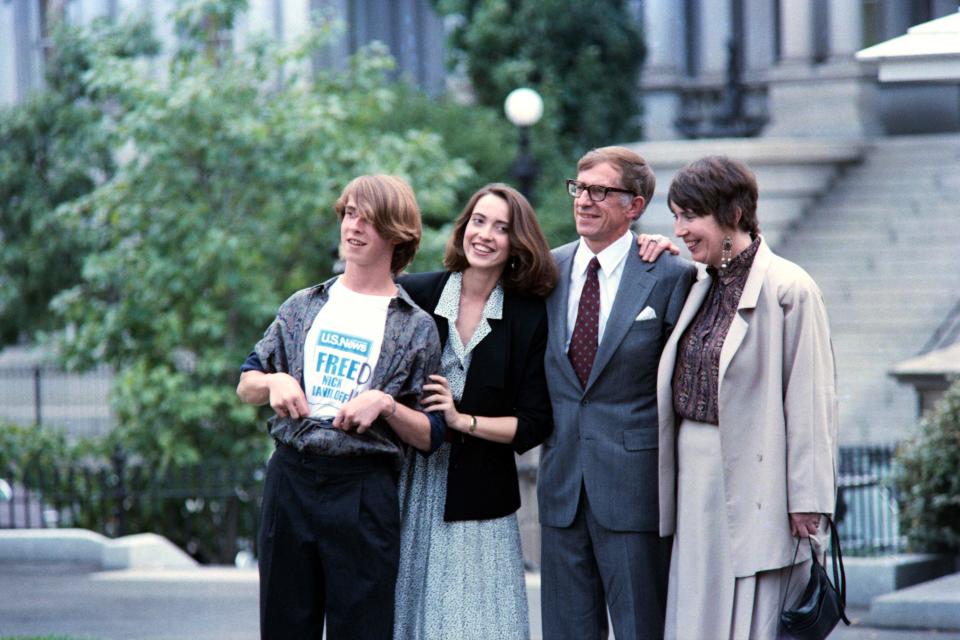Moscow arrest of American on spy charges eerily similar to the 1986 case against U.S. reporter Nick Daniloff
The case against an American arrested in December in Moscow on spy charges for allegedly accepting a flash drive containing classified information is eerily similar – with a high-tech upgrade – to the arrest of U.S. journalist Nick Daniloff in the Soviet Union 32 years ago.
Former Marine Paul Whelan, who said he was in Russia to attend a wedding, was grabbed by Russian security officers Dec. 28 at an upscale Moscow hotel.
His lawyer, Vladimir Zherebenkov, said Tuesday that Whelan had been handed a flash drive that purportedly contained "secret" information by another person whom he declined to identify.
Zherebenkov would not say whether Whelan knew the person, or why he would have passed along classified information.
“Paul actually was meant to receive information that was not classified from an individual,” Zherebenkov told reporters before Whelan's bail hearing. He said the thumb drive was supposed to contain pictures.
"These were cultural things – a trip to a cathedral, Paul’s holiday,” he said. “But as it turned out, it contained classified information.”
Whelan's plight follows the arrest in the United States of accused Russian spy Maria Butina, a 30-year-old, self-styled Russian gun rights activist.
She was initially charged with conspiracy and acting as an agent of a foreign power. In December, she pleaded guilty to a lesser charge – of conspiracy to act as a foreign agent, which could bring a maximum of five years in prison.

Butina agreed to cooperate with U.S. prosecutors, likely lessening her eventual sentence.
Was the Whelan arrest fabricated to match the Butina case and perhaps set up a swap?
"This wasn't planned yesterday. It was probably planned back after (Butina) was arrested," Dan Hoffman, a former Moscow station chief for the CIA, tells The Daily Beast. “They want to deter future U.S. actions against other private citizens."
Daniloff tells USA TODAY that that's what it looked like to him.
"There are a number of Russians in American jails the Russians would like to get back," Daniloff says, including a notorious arms dealer.
In any case, that's how the Daniloff case played out.
In 1986, Daniloff, then a Moscow-based reporter for U.S. News & World Report, was arrested in the Lenin Hills overlooking the capital.
Daniloff wrote after the ordeal that he had been there to meet a friend named Misha, from the city of Frunze, and gave his copies of some Stephen King novels. Misha, in turn, handed him a bag that he said were clippings from Frunze newspapers and photos. Daniloff had gotten such clips before as a way to keep in touch with news from Central Asia.
This time it was different. On the walk home, Daniloff says, a van stopped and a half-dozen men jumped out, pinned him down and cuffed him.
At the KGB's feared Lefortovo prison, Daniloff recalls, the bag he had been handed was opened to reveal photos of what he said looked like amateur snapshots of soldiers and tanks, plus maps stamped "secret." One, he says appeared to be an operational military map from Afghanistan, while the other was an area map with a code name.
Daniloff says he knew immediately after he was grabbed that he would be a hostage for Gennadi Zakharov, the Soviet employee of the United Nations arrested a week earlier in New York for allegedly handing over money to a contact for classified U.S. Air Force documents.
In the end, that's exactly what happened.
After days of intense discussions between Moscow and Washington, Daniloff was allowed to leave the Soviet Union without charges. Zakharov was allowed to leave the United States after pleading no contest to the charges against him. In addition Soviet dissident Yuri Orlov was released to the West.
Daniloff's case, though, took an unexpected twist when "Misha" – the man with the bag of photos in Lenin Hills – emigrated to the United States.
Daniloff said Misha called to renew old ties but that Daniloff refused to meet him after Misha declined to apologize for the notorious incident that landed him in Lefortovo prison.
Daniloff said he learned later that Misha had been involved in a murder along the way in the Soviet Union and was no doubt vulnerable to heavy pressure.
"That's the sort of thing that the KGB can have as a lever over him," says Daniloff. "And the rest is history."
.
.
This article originally appeared on USA TODAY: Moscow arrest of American on spy charges eerily similar to the 1986 case against U.S. reporter Nick Daniloff

